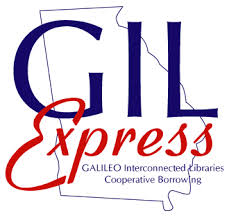KEY DEFINITIONS
- USG: University System of Georgia
- Home Library: The library with which the patron is affiliated. "Home Library" refers to the institution rather than a specific library. For example, University of North Georgia (UNG) patrons are affiliated with the UNG Libraries as a whole, not an individual library on a particular campus.
- Holding Library: The specific library to which borrowed material belongs. This library is referred to as the Owning Library.
- Pickup Library: The library where patrons request GIL Express books be sent for pickup/checkout.
- Visited Library: Any USG library other than the patron's Home Library. This could be for pickup/checkout, returns, walk-up, or in-library use.
- GIL-Find Catalog:A single, unified database containing the holdings of all University System of Georgia Libraries. It has real time links to availability, holdings and item information. Items that do not circulate through GIL Express are included. These items may be available for in-library use at the Visited Library.
PATRON POLICIES
Eligibility:- Currently enrolled students and currently employed faculty and staff in good standing at their University System of Georgia (USG) college or university Home Library are eligible to use GIL Express. Beyond these indiviuals, it is a local decision to include other groups with official relationships with the Home Library. Retired faculty and staff should check with their Home Library to determine if they are eligible to use this service.
- A picture ID card is required to use GIL Express at a Visited Library. While the preferred form of identification is a current, valid picture ID card that is issued by your Home institution, you may also use a government issued current, valid picture ID such as a driver's license or a Georgia ID card, a US passport or a US military ID.
Blocks and Fines:
- The maximum number of overdue items is 1. Accounts will be blocked after a book is 7 days overdue. The block is removed within 24 hours after an overdue GIL Express item is removed from the patron's account.
- Overdue fines are not charged for GIL Express items.
- If a Holding Library charges recall fines for GIL Express items, the fine will be $2.50 per day per item.
- Patrons are charged for the price of lost or damaged items. The price is set by the Holding Library
- If a patron changes schools, the obligation that caused the block at the first Home Library will remain on the patron's record.
Limits:
- The maximum number of requests and number of items a patron can borrow is set by the Holding Library.
[ return to top ]
Managing My Library Account:
- Patrons can sign into their My Library Account from their Home Library GIL-Find Catalog. The Home Library is the default view. Each Holding Library must be selected to see loans with due dates, requests, fines + fees, and blocks + messages.
ITEM POLICIES
Eligibility:
- Books from the general circulating collection that circulate under normal loan rules of each Holding Library are available for GIL Express. Additional material may be designated for GIL Express by individual institutions.
- An eligible item can be requested regardless of whether the patron's Home Library owns the item.
- Exemptions for GIL Express are Course Reserves, Reference, Special Collections, special permission items, materials with shortened loan periods and certain lab collections.
- Each Holding Library may also choose to identify specific item types, such as popular fiction, as not eligible for GIL Express.
- Institutions can distinguish between remote GIL Express and walk-up GIL Express checkouts when deciding how materials circulate. An institution may deny GIL Express remote and/or walk-up requests for items on a case-by-case basis.
Circulation Rules:
- Items can be shipped to any Pickup Library and GIL Express users can checkout eligible items from any Visited Library.
- The loan period is 90 days with no renewals.
- A renewal is allowed as long as the patron remains eligible and the item is not recalled. Self-renewals are allowed.
- GIL Express items can be returned to any USG Library.
NOTICES, BILLING, DAMAGED/MISSING ITEMS, REIMBURSEMENT
Effective 7/1/2022, the Regents Academic Committee on Libraries eliminated the charge of the $35 lost item processing fee for any lost items billed after 7/1/2022.
Notices- Overdue notices are sent from the Holding Library
- When an overdue item is declared lost, a lost fee is charged to the patron’s account.
- If a patron loses a GIL Express item, the patron must contact the Holding Library directly to pay for the book.
- The lost fee is removed from the patron’s account when the lost item is received and scanned at the Holding Library.
- Accepting a replacement copy for a lost book is at the discretion of the Holding Library.
- If the Home Library pays for a book lost by their patron, that patron owes their Home Library for the book
Damaged/Missing Items:
- If it can be determined that a GIL Express patron was the source of damage to a GIL Express item, the Holding Library makes the decision as to the type and extent of the damage and charges the patron for repair or replacement of the item.
Reimbursement:
- Refunds for lost books that have been paid for by the patron are made directly to the patron following the Holding Library’s refund policy.

